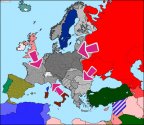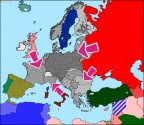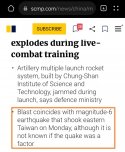(Chinese follows English) (中文在英文后)At this slow pace, I think the risk of secret disclosure is very high.The local people are often quite sensitive to the movements of the army,small vendors dealing with the army may know more about the possibility of military action than Taiwanese spies.
Surprise is always the most important military principle.
Because I am neither a military strategist nor a war planner, so my ideas would have been pretty generalized and more geared towards strategical considerations than tactical considerations.
Yes, you are correct. Surprise is a very important factor for bringing success for the attacking side in any war. But is surprise the only way for winning the war? Not exactly.
Roll the clock back to the first half of 1944 in Europe, when N4z1 Germany is firmly on the defensive, while the Allied Forces are in the offensive. Refer to the map below.

On the Western Front (i.e. France and the Low Countries), the German High Command already knew that the US and Commonwealth Forces would some day land on the beaches of France or the Low Countries, conduct ground warfare and push the Wehrmacht back from the Atlantic coastlines.
On the Eastern Front (i.e. Soviet Union), the Red Army is firmly pushing the Wehrmacht out of Soviet territories, and are heading towards the Balkans and the Romanian oil fields towards the southeast, while also pushing towards Poland and Germany itself towards the west. And similarly, the German High Command knew that those would be the target of advance by the Red Army next.
In short, what does the Allied Forces on these two fronts have in common? No element of surprise - At least, not in a strategic sense. Because N4z1 Germany knew very well around when and where that the Allied Forces would military advance operations against N4z1 Germany in the future.
So what does the Allied Forces on both fronts did? Deception.
Instead of trying to pursuade the German High Command that the Allied forces would not conduct any military operations against them, they go with fooling and baiting the German High Command into perceiving what the Germans themselves believe are the real timings, forces involved and direction of advance against the Wehrmacht - all of which are just a distraction or fakes.
For the US and Commonwealth forces, they successfully baited the Wehrmacht forces defending the Atlantic Wall into thinking that they would be storming Calais (which has sizeable port facilities) instead of Normandy (which has nothing but beaches), thanks to Operation Fortitude. Therefore, the Wehrmacht was duped into defending Calais from the expected Allied landings there, instead of Normandy where the Allied forces had easier time to gain a foothold on mainland Europe before marching towards inland.
For the Soviet forces, they employed Maskirovka to fool the German High Command into thinking that the Red Army is focused on advancing towards the Balkans and the Romanian oil fields, instead of towards Poland and N4z1 Germany itself. For instance, the Red Army drove their tanks away from the front in Belarus in direct sight of the German forces there during the day, only to drive them back to their original staging point at night. In the end, the German High Command deployed their strongest units to the Balkans, leaving their front in Belarus wide open for the Red Army to smash through with relative ease.
Coming back to Taiwan - With how advanced spying and reconnaisance satellites are today, it is virtually impossible to hide gathering military forces. You can be assured that the US are on a 24/7 lookout along China's eastern and southeastern coastlines for any potential massive PLA troop and equipment gatherings. Therefore, it is pretty hard to hide from the satellites up above, let alone from the citizens on the ground with their smartphones and VPN.
Don't believe me? Just look at how the US having already sounded alarm of Russian troops and equipment gathering spots around Ukraine since April 2021 - 10 months before the start of Russia's "special military operation" against Ukraine in February 2021.
So what should the PLA do? This is related to your comment towards the end of your response as following:
Although I wouldn't classify the effects as "a total surprise", but your idea is actually viable. In short, the PLA should constantly conduct military exercises of a considerable scale at those regions before simply dispersing, just so that the US and Taiwan would be send into an fury of alert everytime the military exercise is conducted.My idea is contrary to yours. I think it is better to adopt fatigue tactics.Through continuous large-scale exercises to confuse the Taiwan army and the United States.
Put them in the mental torture of high alert,from a physiological point of view, no one can maintain a long-term state of vigilance.When they see this as another bluff, the surprise attack will be fatal.
There is no use for China to deny that they wouldn't launch military operations to reunify Taiwan at anytime she desires, so might as well go with proper deception strategies and tactics.
Caution fatigue would then overwhelm the US and Taiwan after being taken along for the "fear ride" for so many times, that their alert capabilities would be diminished.
However, extra care must be taken when conducting such military exercises by the PLA in order to not ramp up the cross-strait tension too much into akin something like the Soviet's response to the Able Archer 1983 military exercise by NATO.
(中文)
因为我既不是军事战略家,也不是战争策划者,所以我的想法会很笼统,更倾向于战略考虑而不是战术考虑。
没错。在任何战争中,对于进攻方来说,惊喜对于带来战场上得成功是一个非常重要的因素。但是,惊喜算是赢得战争的唯一途径吗?非也。
让时间倒流到1944年上半年的欧洲,当时纳粹德国坚定地处于守势,而盟军则处于攻势。请看下面的地图。

在西线(即法国和低地国家),德军最高统帅部已经知道,美国和英联邦部队总有一天会在法国或低地国家的海滩上登陆,进行地面战争,把德军从大西洋海岸线上逼退。
在东线(即苏联),红军正坚定地将德军赶出苏联领土,并朝着巴尔干半岛和罗马尼亚油田的西南方向前进,同时也朝着波兰和德国本土的西部方向推进。而同样的,德军最高统帅部也知道,这些都将是红军下一步的进军目标。
简而言之,这两条战线上的盟军有什么共同点?没有惊喜的因素 - 至少可以说,在战略意义上没有惊喜。因为纳粹德国非常清楚地知道,盟军在未来何时何地会对纳粹德国进行军事推进行动。
那么,盟军在两条战线上都做了什么?欺骗。
他们并不试图劝说德军最高统帅部,说什么,盟军不会对他们进行任何军事行动等类型的话;相反的,而是去愚弄和诱导德军最高统帅部,让德军自认为都是对的时间、参与力量和推进方向 - 所有这些都实际上只是分散注意力或者假象。
对美国和英联邦部队来说,他们成功地诱使防守大西洋墙的德军认为他们将攻打加莱(那里有相当规模的港口设施),而不是诺曼底(那里除了海滩什么都没有),这要归功于 "毅力行动"。因此,德国国防军被骗去防守加莱,以应对盟军在那里的预期登陆,而不是诺曼底。这导致盟军在那里能更轻易地在欧洲大陆站稳脚跟,然后向内陆进军。
对于苏军来说,他们利用马斯基罗夫卡(Maskirovka)手段来欺骗德军最高统帅部,使其认为红军的重点是向巴尔干和罗马尼亚油田推进,而不是向波兰和德国土身推进。例如,白天时候红军在白俄罗斯里在前线德军的直接视线中把他们的坦克从前线撤走,而在晚上时候把他们撤回他们原来的集结点。最后,德军最高统帅部把他们在东线最强大的部队部署到巴尔干地区,把他们在白俄罗斯的战线敞开,最后让红军相对轻松地砸开。
回到台湾 - 由于今天的间谍和侦察卫星是如此先进,要隐藏聚集的部队和装备是几乎不可能。不用猜也知道,美国军事间谍和侦察卫星正沿着中国东部和东南部海岸线上空24小时监视任何潜在的大规模解放军部队和装备的聚集。因此,很难瞒过上面的卫星,更不用说瞒过地面上拥有智能手机和VPN的民众。
要实际例子的话,就看看美国是如何从2021年4月起就对乌克兰周围的俄罗斯军队和设备聚集点发出警报的 - 那是在2021年2月俄罗斯对乌克兰的 "特别军事行动 "开始前10个月。
那么解放军应该怎么做?这与您在回复最后的评论有关。
虽然我不会把这种效果归为 "全面的惊喜",但你的想法其实是可行的。简而言之,解放军应该时时刻刻在当地进行相当规模的军事演习,然后再解散,就是为了让美国和台湾在每次进行军事演习时都会陷入警惕。
中国否认不会在任何时候发动军事行动来统一台湾是没有用的,所以不妨采用适当的欺骗战略和战术。
美国和台湾在多次被带入 "恐惧之旅 "后,谨慎的疲劳感会压倒他们,他们的警戒能力会逐渐地被削弱。
然而,在解放军进行这种军事演习时,必须格外小心,以免两岸关系变得过度紧张,变成类似于苏联对北约1983年 "射手 "军事演习的反应。
Last edited:


